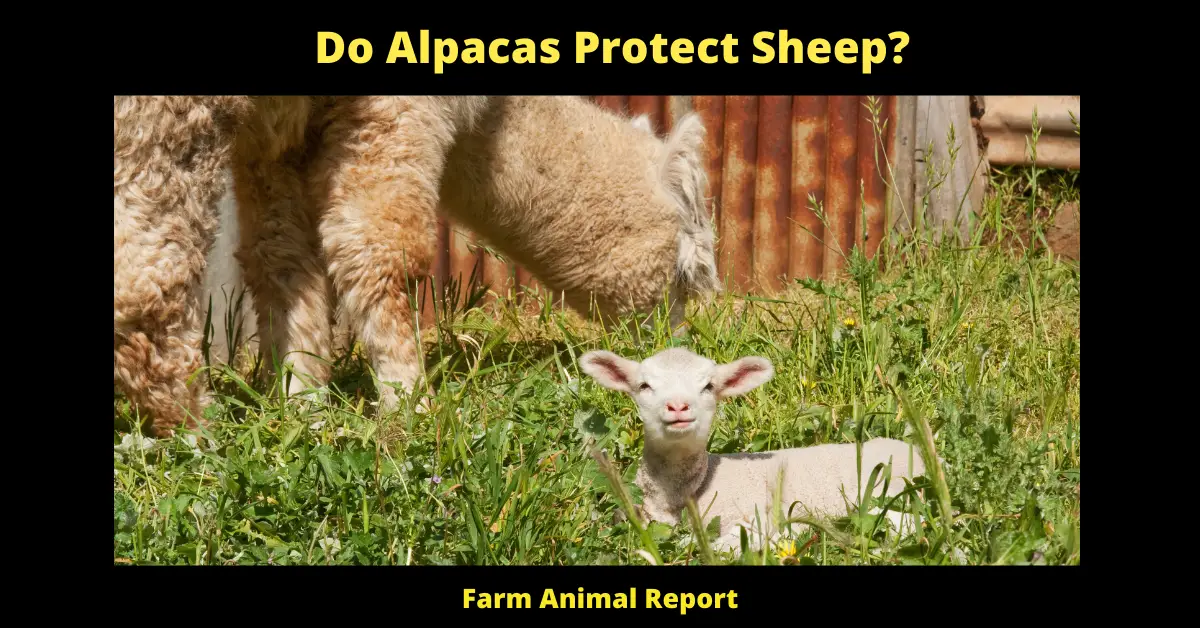As a General Rule, they protect sheep. People use them to guard the flock and to protect them from different species like dogs and foxes so that they can’t hunt lambs. They are good at protecting the flock during the lambing season. Although they are shy of people they are good predators. They can easily chase those dogs that seem like a threat to the flock.
Do Alpacas Protect Sheep / Will Alpacas Protect Lambs?
Do Alpacas Protect Sheep / Will Alpacas Protect Lambs? Among camelid species of South America, Alpacas are one of the four members. They are intelligent, hardy, and gregarious animals like other camelids. Many of the time, they are confused with llamas, but they are noticeably smaller than them. Alpacas are slender-bodied animals with long necks and long legs, a short tail, a small head, and large pointed ears. The alpaca also differs from the llama in that it has a rounded body rather than a square one and in its habit of pressing its tail against the body, rather than holding it upright as the llama does. The furry fur of the alpaca ranges in color from the usual black or brown, though lighter shades of gray and tan to pale yellow and occasionally, white. alpaca protect sheep
.
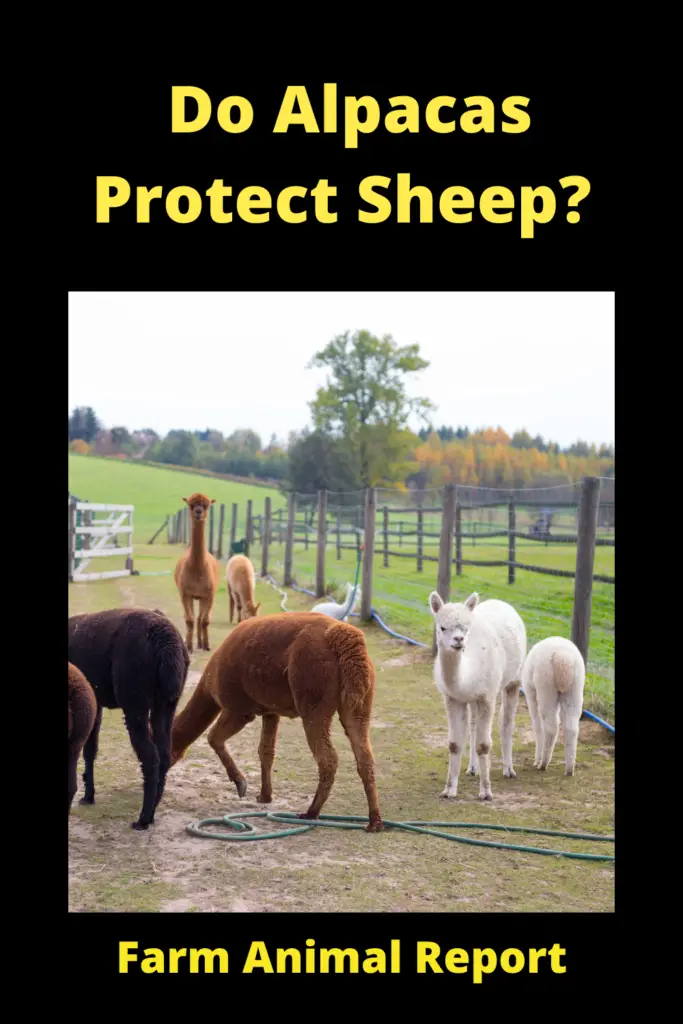
Why do Alpacas Protect Sheep?
Alpacas are considered a good guard for sheep because of the execution features they possess. They have excellent sight over to kilometer distance, ( 1/2 Mile) and are very alert to animals or people approaching a paddock, pasture. Although normally almost silent, the alpaca can give a loud alarm cry when exposed to potential danger, alert their herd and owners.
Primer Of Livestock Guardian Animals
The instinct for one or two alpacas to bond with other pastures herds of animals, and especially their proven ability to protect sheep and goats, has led to increasing use of adult male alpacas as guardians of the sheep flock – especially during and after lambing and calving.
18 ways Alpaca Farmers make Money
Alpacas are normally gentle on humans and other animals who are not perceived as threatening but who have an innate aversion for canines and foxes. Their defense against such predators is to chase or pursue them and if necessary, stomp on or on the predator with their front legs, rising from the on the ground on their hind legs, if necessary, before bringing their front legs down with considerable force.
How to Train an Alpaca to Guard Sheep? Guard Animals
Alpacas are generally easier to train while they are being weaned because they are more willing to be led and used to authority. You can train old alpaca, but like an old dog, or an old human, it is not so easy to teach them new tricks.
Here are 10 Steps to Train an Alpaca:
- Make sure you have a thick, soft cotton rope for each animal, and a secure pole to tie each animal apart so they don’t touch each other.
- Grab a new bicycle inner tube per animal.
- Fix an inner tube to each training post.
- Fit the halter of each animal properly so it can’t escape or hurt itself.
- Take an alpaca to a training spot, then tie the lead rope to the inner tube with a quick-release knot so it can’t be sped up or released at a bad time.
- Make sure there is about 1.5m (5 Ft ) space between the post and the halter.
- Move away but don’t leave. You will probably notice that the alpaca pulling to get free, but the harder you pull, the greater the opposing force of the inner tube is.
- Most alpaca quickly learn that it feels much nicer to keep their lead rope slack. If yours doesn’t and it stops with a taut lead rope, you can gently push the animal forward to reduce the tension
- Your alpaca is now calmly on a tightrope, which means you can carefully approach, release the rope, remove the halter, and set it free
- The alpaca may not understand the first time. If it’s still hesitation there after a quarter of an hour, gently push it forward, loosen the lead rope, and release it.
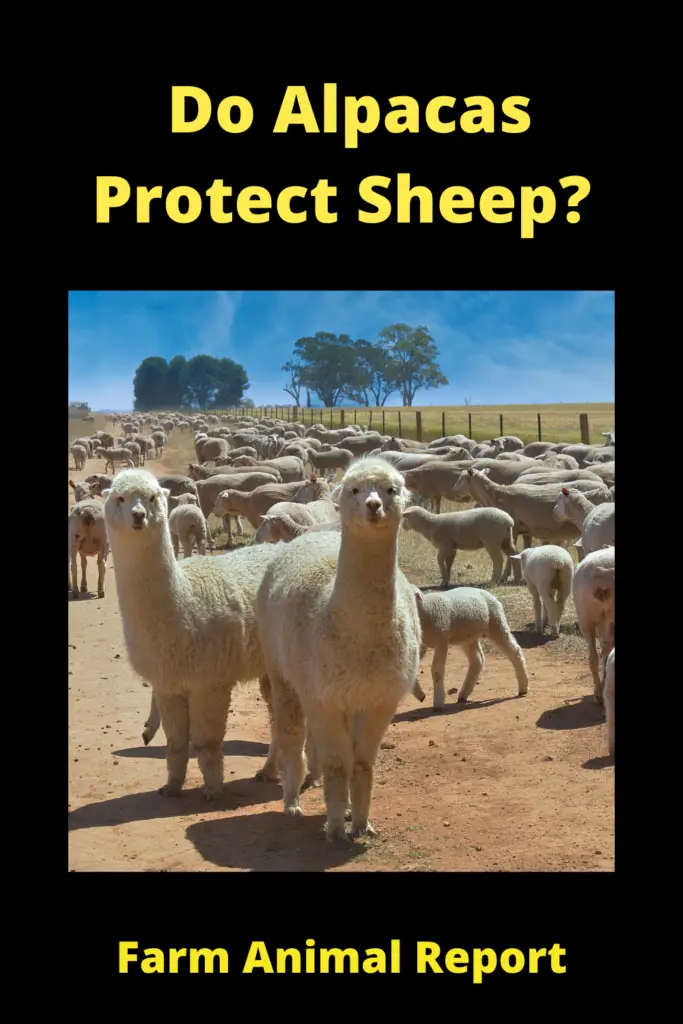
How Many Guard Alpacas do you Need to Guard Sheep?
The number of Alpaca you use will depend on many factors
- Individual guard alpaca (two or three alpacas are often used together, as is one alpaca – all will bond well with the host flock)
- Size of the paddock, Pasture
- Number of animals to be guarded
- The layout and terrain of the farm
If several alpacas are kept together, they can spend more time in each other’s business, however, some farmers report success in the run-up to six guardian alpacas with very large lambs flocks of sheep for additional protection against eagle and raven attacks, as well as wild dogs and foxes.
55-60 sheep can be protected by a single alpaca, however, many alpacas can protect a large flock. A single alpaca may not be as effective as several for a large flock. A couple of alpacas can only protect a small flock or a small number of sheep. Hence, more alpacas, more protection.
What are Natural Predators of Sheep?
Sheep are vulnerable to a variety of predators including coyotes, foxes, wolves, mountain lions, bears, and domestic dogs. Golden eagles are also known to feed on bighorn sheep. To protect themselves from predators, mules or llamas are often mixed with flocks of sheep.
Coyotes are responsible for more than 50% of all sheep deaths from predators in the US each year. Dogs are the second most dangerous predator of sheep and lambs with almost 23%. Mountain lions take just under 8% of sheep killed by predators each year. Bears rank as the fourth most dangerous sheep predator … responsible for 4.5% of annual sheep deaths caused by predation in the US.
Bobcats and lynxes account for just over 3% of the total each year. Eagles are responsible for about 1% of lamb kills to predators. Foxes have about 0.5% of sheep predator deaths per year and the last 8.5% can be attributed to a collection of animals, including wolves, vultures, crows, and unknown predators)
Due to their inherent vulnerability, sheep are easy victims of larger animals. Brown and black bears have been known to eat almost an entire sheep. Bobcats naturally prefer the hindquarters of sheep, while dogs go for the flanks, head, and hindquarters of sheep when attacking. Wild pigs prefer lambs, while cougars feed an average of five to ten sheep in a single hunting spree.
How do Sheep Protect/Defend Themselves?
Sheep are not considered aggressive animals that would take on an attacking predator, there are some things they do to protect themselves:
- By Running Away From Predators:
As animals of prey, a sheep’s first and foremost thought is to run away from anything that might be a threat. Sheep can run fast for small livestock; they have been measured to charge as fast as 20 mph (32 kph), so if they are in a dead sprint they can probably run much faster. - By Staying in a Flock
Another characteristic of prey animals is that they usually live in a community environment with the same species. The reason is that in a flock, many more eyes and ears are looking and listening to danger compared to a single particular animal.
If a sheep is isolated or does not have a herd, it feels more susceptible to predators. It can lead the sheep to develop anxiety and depression. For this reason, it is not a good idea to have one sheep alone.
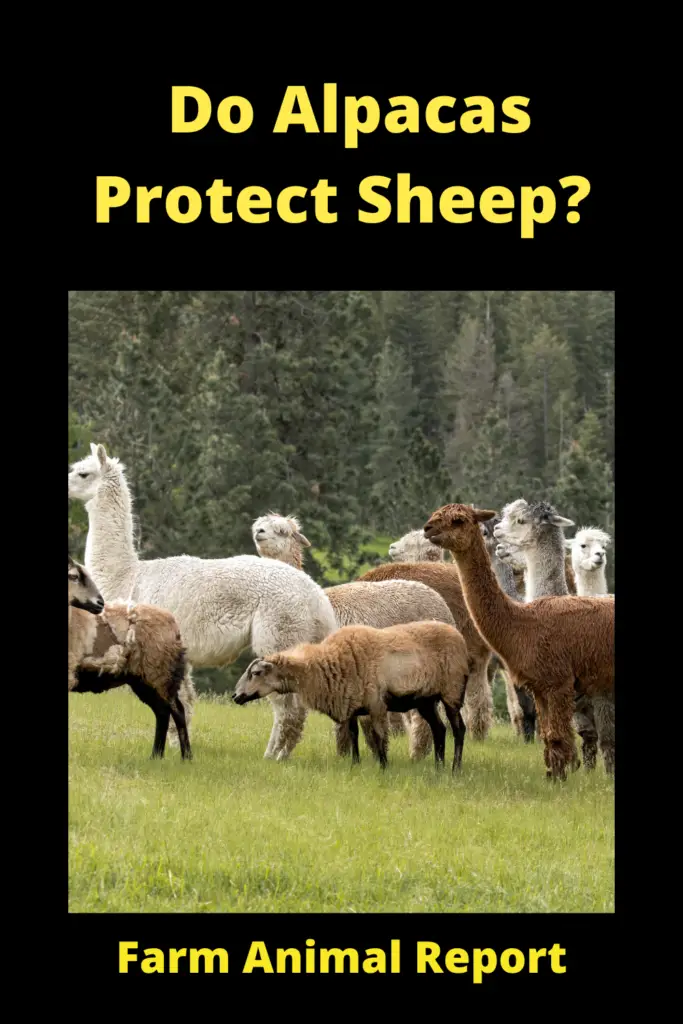
By Using Their Senses to Notice Danger
Sheep have good senses that allow them to recognize danger before it is too late. Sheep have good eyesight through monocular vision, which is when the eyes are position on the sides of the head. It allows them to see almost 360 ° of their surroundings at all times. Most prey animals have monocular vision, while predators have binocular vision, where their eyes are at the front of their head, and they can only see what is in front of them.
Sheep also have excellent hearing. Its ears can rotate in all directions, allowing them to pick up the faintest sounds in the distance. Another sense they trust is the smell. Sheep can recognize an unfamiliar scent and be wary of it until they can inspect it further. When they smell a predator, they can be instantly on the alert.
Rams and Dominant Ewes Are More Likely to Stand Up Against Predator
While domesticated sheep will rarely face a predator, it does happen on occasion. While an aggressive sheep may not be enough to stop a predator’s attack, it can frustrate the predator long enough for the herd to reassemble. Of his flock, the most likely defense against a predator would be a ram. A ram is an intact male sheep that are often larger, stronger, and more aggressive than other sheep.
Wild Sheep Live on Cliffs to Deter Predators from Catching Them
Wild sheep tend to live on cliffs and high mountains, where predators would not want to go. They can balance and jump from rock to rock to escape danger, seeking the highest ground where the predator cannot reach them. Wild sheep breeds often have magnificent large horns that are used to defend themselves and drive off other animals. Wild sheep are a sight to behold!
Are Alpacas Good for Guarding Sheep?
Alpacas are very good at caring for flocks of sheep, especially during the lambing season. They can see dogs and foxes approaching the herd. These alpacas are shy around people, but they are on the alert for predators. If a dog is on a leash, they are unlikely to approach, but they may chase loose dogs that they see as a threat to the herd.
Alpacas are fast becoming one of the most efficient, cost-effective ways of protecting sheep flocks from lurking predators on farms nationwide. Social animals warn herds about intruders with a high-pitched, loud, high-pitched screech. They also attack smaller predators with their front legs and can spit and kick. Foxes are a particular enemy of the alpaca.
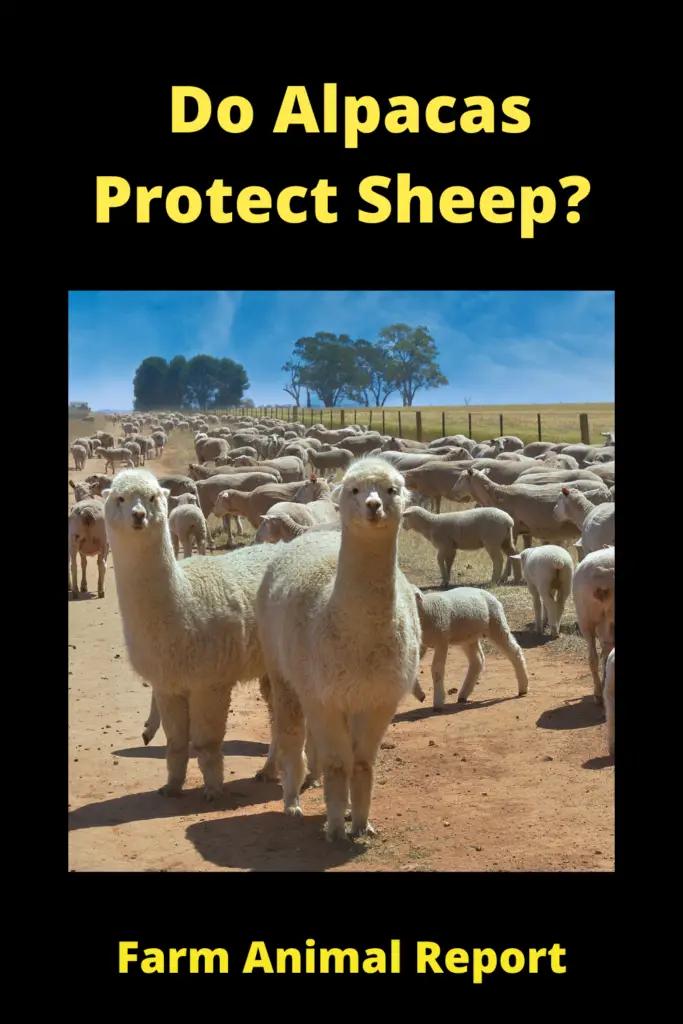
Will all Alpacas Guard sheep?
Yes, all alpacas protect sheep. They are male, female, old, or young. However, there is a difference in response among each of them, but they do provide protection.
Final Thoughts -Alpaca Protect Sheep
Many sheep breeders have reported their best-ever lambing percentages following the introduction of guardian alpacas. Alpaca wethers are readily available at a low cost. In comparison to their benefits, and feeding and husbandry costs are also less. These quiet and friendly animals are rapidly becoming accepted as essential complements to sheep and goat breeding enterprises where predators cause lambing and kidding losses.


